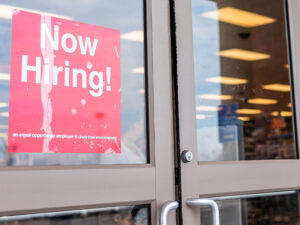The month of April 2022 saw 4.4 million U.S. workers quit their jobs — an astonishing three percent of the entire workforce. Fueling many of these resignations are long-time complaints of low pay and taxing working conditions among most hourly and entry-level positions.
Despite noteworthy inflation rates, many industries have been able to increase hourly and daily pay rates by passing on extra costs to consumers, yet retail has historically been an exception. While diners and other service consumers may be willing to shell out more for an experience, the nature of retail purchases mean buyers become sensitive to price hikes for the exact same goods and services.
Reducing Employee Turnover
However, failing to address employee needs amid a major labor shortage produces catastrophic limits to available throughput and revenues. Factoring in lost productivity, rehiring costs, onboarding, and training requirements, employee turnover quickly eats into margins. Turnover across the retail industry is at 4.2 percent, significantly more than the national average (2.8 percent).
So, what’s convincing workers to walk away from retail jobs, or the industry altogether? Most research into the phenomenon points back to one factor — instant pay upgrades. Roughly two-thirds of global companies are raising hourly and daily pay rates, improving flexibility, and offering better benefits to attract talent. Companies able to pivot to worker desires like this will be able to attract and retain the employees needed to run operations.
It’s Not So Simple
Though independent retailers have the flexibility to increase hourly wages and improve employee offerings, managers and GMs at corporate outlets often lack the authority to unilaterally make these decisions. For corporate retailers struggling to attract talent, waiting for the central office to grant approval can seem like an eternity.
Even once in place, retailers often struggle to offset rising labor costs through price hikes. After all, the common thinking is shoppers are price sensitive and will therefore buy less or shop elsewhere for a better deal.
However, with current employees in danger of burning out and potential ones in danger of rejecting a job posting with low wages, retailers must find ways to increase salaries while maintaining profits. A successful talent acquisition strategy will require a wide-ranging approach beyond these that addresses pay and benefits.
Making Employees Advocates
Whether corporate or independent, retailers able to increase hourly wages don’t have to just increase inventory prices and leave it at that. Communicating new initiatives with customers and employees builds trust and loyalty that pay off over the long run.
As mentioned, higher pay boosts employee morale. A worker more able to meet the costs of living will feel less of a need to pursue better opportunities and more importantly, be able to handle the challenges of their position with less risk of burning out.
In addition to potentially increasing hourly and daily pay, retailers should reevaluate the way pay is distributed. Moving commission-based sales positions to hybrid hourly/commission compensation packages can encourage healthy competition while still rewarding top performers.
Crucially, improving pay increases the quality of operations. When all factors are equal, workers will take jobs that offer the most money. Therefore, higher-quality workers will be interested in positions matching their perceived market value. The downstream effects of this talent boost include more efficient operations, more talented sales teams, and a more positive workplace culture.
Customers will notice a change as well. These more bought-in employees provide more satisfactory customer service and lead to more positive online reviews. Customers who have positive in-store experiences are more likely to return, so a motivated workforce able to provide these experiences creates a differentiating factor in the consumer’s mind.
If customer weariness to rising prices is still a concern, go on the offensive with a well-crafted social media and public relations campaign to announce pay raises. Not only will this attract more talent to apply, but with inflation forecasted to slowly wind down, your organization has plenty of time to raise prices in the short term to match competitors while working to cut costs and slowly bring prices back down over the long run.
One Low-Cost Benefit: Daily Pay Access
The Great Resignation is shaping the U.S. workforce beyond salary, bringing benefits where there weren’t any before.
This is where Fuego, the on-demand pay service for hourly workers comes in. It’s a self-explanatory offering — instead of limiting worker paydays to the traditional semi-monthly schedule, employees have opportunities to request early access to earned wages, on demand.
This daily pay access allows employees financial flexibility, especially valuable knowing your workers must deal with inflation just like your business and customers. With the ability to meet needs external to the job — e.g., sudden bills, inflating groceries — employees bring less stress into the workplace, and employers have a unique recruiting tool that encourages long-term retention.
For HotSchedules retail customers, Fuego offers on-demand pay services — while syncing with HotSchedules scheduling data. In addition to early paycheck withdrawals, workers with HotSchedules and Fuego can view their clocked shifts to calculate available funds and view earnings potential for upcoming shifts, incentivizing full schedules.
The pandemic has created a new workforce with different priorities, but this doesn’t have to be a drawback. By skillfully creating the conditions for a dedicated and driven workforce, you can set a long-term competitive advantage through superior talent, efficiency, and customer experiences.
Learn how Fuego can give your business an advantage in the race to overcome The Labor Shortage: https://getfuego.com/getdemo.


